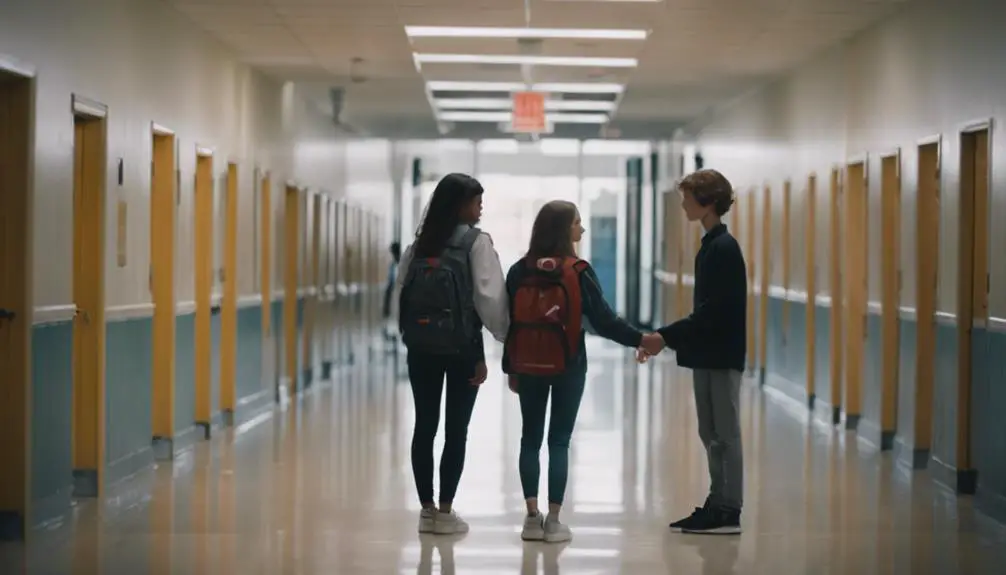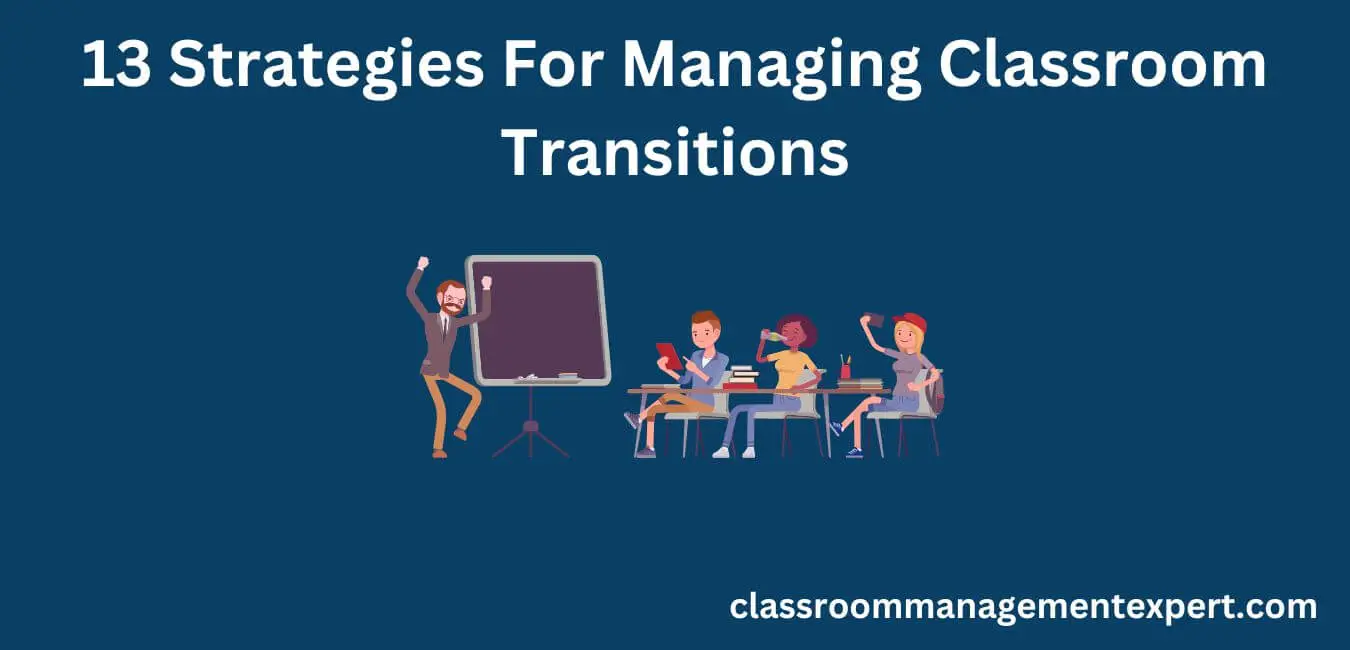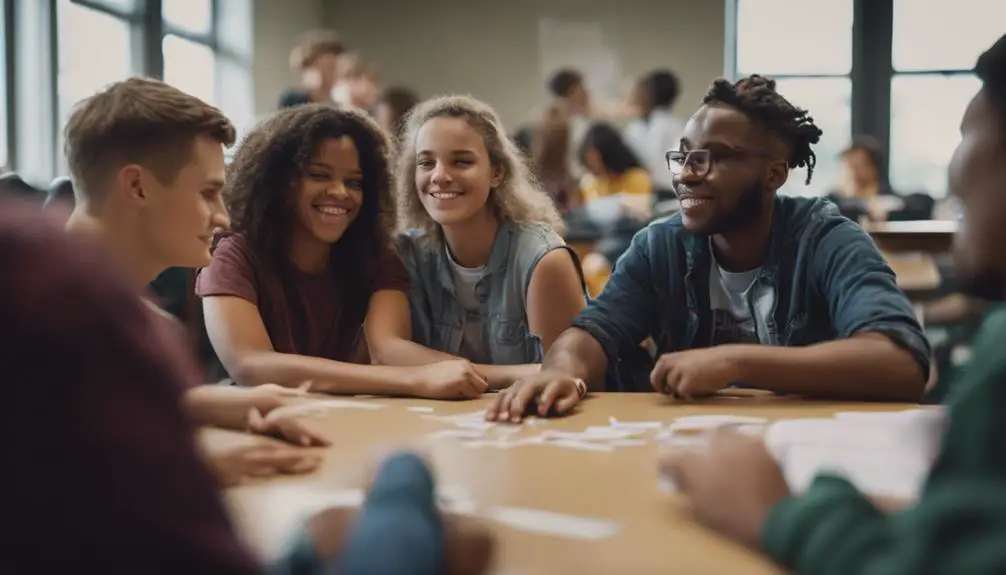In my experience, immersing oneself in peer interactions can help reduce school violence by nurturing empathy, communication skills, and teamwork. It encourages understanding different viewpoints, peacefully resolving conflicts, and building a supportive community.
By promoting inclusivity, fostering open dialogue, and teaching problem-solving strategies, students can learn how to resolve disagreements constructively. Engaging in empathy-building activities and conflict resolution workshops empowers students to approach conflicts with kindness and respect, enhancing emotional intelligence, reducing aggressive behaviors, and strengthening school relationships.
This creates a harmonious and secure environment for all students to thrive.
Building Empathy Among Students
To foster empathy among students, we incorporate engaging activities that promote perspective-taking and emotional understanding. Through interactive empathy workshops, students are encouraged to consider various viewpoints, nurturing compassion and kindness.
Peer support groups offer a safe environment for students to share their thoughts and feelings, strengthening empathy and building connections with their peers.
Role-playing exercises enable students to step into different perspectives and emotions, gaining firsthand experience in understanding others. Participation in conflict resolution workshops equips students with the skills to navigate disagreements with empathy and find peaceful solutions that benefit everyone involved.
These initiatives not only cultivate empathy but also establish a culture of respect and support within the school community. By emphasizing emotional intelligence and perspective-taking, students are empowered to communicate effectively, resolve conflicts peacefully, and contribute to a safer school environment.
Teaching Problem-Solving Skills
Imagine standing in front of a mirror, envisioning yourself honing critical thinking and collaboration skills through structured problem-solving activities in peer mediation programs. Teaching these skills is crucial for empowering students to adeptly resolve conflicts. Let’s delve into how peer mediation programs foster the development of problem-solving skills in students:
- Exploring Problem-Solving Strategies: Students engage in pinpointing the root causes of conflicts and brainstorming potential solutions collaboratively.
- Peer Guidance: Peers offer a supportive environment where students can practice applying problem-solving strategies to address disagreements effectively.
- Conflict Resolution Techniques: Through guided exercises, students acquire skills to peacefully and constructively resolve conflicts.
- Enhanced Teamwork: Collaborating in peer mediation sessions enhances students’ ability to communicate clearly, actively listen, and find common ground with others.
Encouraging Effective Communication
Encouraging effective communication plays a crucial role in enhancing positive interactions and resolving conflicts in peer mediation programs. Communication strategies are vital tools for promoting understanding and creating a supportive environment for individuals to express their thoughts and feelings openly.
In peer mediation, active listening stands out as a fundamental aspect that enables participants to truly listen to each other and grasp diverse perspectives. Through active listening, peers can show empathy, validate each other’s experiences, and collaborate on finding solutions that benefit everyone involved.
Dealing with conflicts becomes easier when individuals engage in open and honest communication. Encouraging peers to communicate respectfully, listen attentively, and express themselves clearly can lead to more productive conversations and fewer misunderstandings. Effective communication also aids in diffusing tense situations and encouraging a cooperative approach to resolving problems.
Fostering a Sense of Community
Fostering a sense of community plays a vital role in setting the stage for successful peer mediation.
Trust is the foundation for effective communication and conflict resolution among peers.
Encouraging empathy, understanding, and teamwork in mediation can strengthen bonds within the school community, creating a supportive environment where everyone feels valued and heard.
This sense of togetherness can lead to more peaceful resolutions and a more positive school experience for all involved.
Building Trust Among Peers
Building trust among peers is crucial for fostering a strong sense of community within a school environment. Engaging in trust-building activities and exercises can create a safe and supportive space for students to connect with one another.
Here are four effective ways to enhance trust among peers:
- Morning Circle: Start each day by gathering students in a circle to share positive experiences or thoughts. This practice encourages empathy and strengthens bonds among peers.
- Peer Mentorship: Pair older students with younger ones to establish mentorship opportunities. This not only fosters trust but also enhances peer relationships and mutual support.
- Collaborative Projects: Encourage students to collaborate on projects that require them to leverage each other’s strengths. This promotes trust and deepens peer connections.
- Open Communication Channels: Provide platforms for students to express themselves openly and freely. Cultivating a culture of open communication nurtures trust among peers and cultivates a sense of belonging.
Encouraging Empathy and Understanding
To foster a strong sense of community, it’s essential to nurture empathy and understanding among peers in order to create a supportive school environment. Empathy workshops and understanding circles provide valuable opportunities for students to gain a deeper understanding of each other’s emotions and experiences. These initiatives help cultivate a culture of compassion and kindness within the school community.
Through compassion training, students develop the ability to empathize with others, which enhances their capacity to address conflicts with sensitivity and understanding.
Perspective sharing is another effective strategy for promoting empathy and understanding among peers. When students exchange viewpoints and listen to each other without bias, they gain valuable insights into different perspectives and learn to appreciate diverse opinions. This practice fosters a sense of unity and collaboration, laying the foundation for peaceful interactions and effective conflict resolution.
Promoting Teamwork in Mediation
Imagine yourself standing in front of a mirror, ready to embark on a journey of teamwork in mediation. By engaging in various activities together, students can strengthen their sense of community and mutual support.
Let’s delve into ways to promote teamwork and unity in mediation sessions:
- Teamwork Exercises: Encourage students to collaborate and communicate effectively by solving puzzles or taking on challenges as a team.
- Role-Playing Scenarios: Foster empathy and understanding among students by having them step into different roles during mediation sessions.
- Group Problem-Solving: Present students with mediation scenarios that require collective brainstorming and decision-making to reach peaceful resolutions.
- Trust-Building Activities: Create opportunities for students to build trust through exercises that promote openness, honesty, and vulnerability within the group.
Promoting Understanding of Diverse Perspectives
Cultivating empathy for others and encouraging open communication are crucial for promoting an understanding of diverse perspectives.
Creating an environment where individuals feel comfortable sharing their unique experiences and beliefs can help build bridges of understanding and respect.
These efforts can ultimately lead to reduced conflicts and a more harmonious school community.
Let’s delve into the importance of empathy and communication in fostering a culture of inclusivity and mutual understanding.
Cultivating Empathy for Others
Understanding different perspectives plays a crucial role in fostering empathy towards others in peer mediation. It enables us to form deeper connections and cultivate a sense of understanding and compassion.
To enhance empathy in peer mediation, here are some practical steps to consider:
- Engage in Empathy Workshops: Joining workshops that focus on empathy can enhance our ability to comprehend and empathize with the emotions of others. These workshops offer valuable skills and insights that are essential for effective peer mediation.
- Cultivate Strong Peer Relationships: Establishing meaningful bonds with peers creates a supportive atmosphere where empathy can flourish. These connections serve as a strong foundation for empathetic communication and effective conflict resolution.
- Listen with an Open Heart: Actively listening to others without judgment or preconceptions is essential for developing empathy. By genuinely hearing and acknowledging diverse perspectives, we can nurture empathy in peer mediation.
- Prioritize Understanding Others: Placing importance on understanding others before seeking to express ourselves fosters a culture of empathy. This approach promotes mutual respect and consideration in peer interactions, leading to more successful mediation outcomes.
Encouraging Open Communication
Engaging in open and honest conversation is crucial for fostering a deeper understanding of diverse perspectives in peer mediation. When conflicts arise, promoting transparent communication allows all parties involved to freely express their thoughts and feelings.
Listening actively to each person’s perspective and honing effective communication skills enables peer mediators to bridge the gap between differing viewpoints.
Conflict resolution becomes more attainable when individuals feel heard and respected. Through open communication, mediators can uncover underlying issues, facilitate constructive dialogue, and guide conflicting parties towards finding common ground.
This process not only resolves immediate disputes but also cultivates a culture of understanding and empathy among peers.
Encouraging open communication in peer mediation demands patience, active listening, and a willingness to consider perspectives beyond our own. By refining communication skills and establishing a safe space for dialogue, peer mediators can significantly contribute to reducing school violence and nurturing a harmonious learning environment for all.
Empowering Students to Resolve Conflicts
Implementing peer mediation programs in schools empowers students to independently resolve conflicts. Through role-playing scenarios and conflict resolution workshops, students can develop the confidence and tools necessary to address disagreements effectively.
Here are four ways in which empowering students to resolve conflicts through peer mediation can have a positive impact:
- Building Empathy: Engaging in role-playing scenarios helps students practice understanding different perspectives, fostering empathy and compassion towards those involved in a conflict.
- Enhancing Communication Skills: Conflict resolution workshops offer students opportunities to improve their communication skills, including active listening and expressing thoughts clearly and respectfully.
- Promoting Collaboration: Encouraging students to work together to find mutually beneficial solutions promotes teamwork and cooperation in resolving conflicts.
- Fostering Independence: Empowering students to resolve conflicts independently boosts their self-reliance and problem-solving abilities, preparing them for future challenges.
Empowering students through peer mediation not only reduces school violence but also cultivates a culture of understanding and harmony within the school community.
Creating a Safe Space for Discussions
Creating a safe environment for discussions is crucial for effective peer mediation. Building trust by being open allows students to feel at ease sharing their thoughts without the fear of being judged.
Encouraging active listening and fostering empathy and understanding are key elements in maintaining a respectful and productive conversation.
This foundation of trust and respect is essential for successful peer mediation sessions, where all parties feel heard and valued.
Establishing Trust Through Openness
Consistently nurturing an environment of open communication is crucial in peer mediation to ensure that all parties feel heard and respected. Trust building and communication skills form the foundation of effective peer mediation.
To establish trust through openness and foster empathy, let’s explore four key practices to create a safe space for discussions:
- Encouraging Vulnerability: By sharing our vulnerabilities, we can inspire others to open up and express their thoughts and feelings without fear of judgment.
- Active Engagement: Actively listening and engaging with the parties involved shows genuine interest and respect for their perspectives.
- Creating a Non-Judgmental Atmosphere: Emphasizing understanding over evaluation helps cultivate an environment where everyone feels comfortable expressing themselves.
- Promoting Respectful Dialogue: Setting ground rules that prioritize kindness and understanding encourages respectful communication among all participants.
Encouraging Active Listening
Encouraging active listening in peer mediation sessions is crucial for establishing a respectful and safe environment where all participants feel heard and understood. Active engagement and sharp listening skills are key components of effective communication.
As a peer mediator, my role involves facilitating discussions where each individual has the opportunity to express themselves openly and be truly listened to.
To promote active listening, I set a tone of respect and attentiveness. I maintain eye contact, nod in acknowledgment, and use verbal cues to show my involvement in the conversation. By modeling good listening practices, I encourage the parties involved to do the same, fostering an atmosphere where empathy and understanding can flourish.
Through active listening, my goal is to create a space conducive to peaceful conflict resolution. When individuals feel valued and listened to, they’re more likely to work together towards finding solutions that benefit everyone.
Active listening goes beyond just hearing words; it involves understanding emotions, perspectives, and underlying needs. By honing our listening skills, we can build pathways for communication and reduce the risk of school violence.
Promoting Empathy and Understanding
In order to cultivate empathy and understanding during peer mediation sessions, establishing a safe and conducive space for dialogue is crucial. Our focus on fostering empathy and understanding revolves around creating a foundation of trust and openness.
Here are four key components that play a vital role in creating a safe and supportive environment for meaningful discussions:
- Empathy Building Workshops: Host workshops that encourage participants to see things from each other’s perspectives, helping them gain a deeper understanding of different viewpoints and experiences.
- Engaging Activities for Understanding: Incorporate exercises that promote active listening and reflection, enabling individuals to truly grasp the emotions and thoughts behind others’ words.
- Guidelines for Respectful Communication: Set clear communication guidelines that highlight the importance of respect, patience, and validating each other’s feelings during discussions.
- Effective Conflict Resolution Strategies: Provide participants with practical conflict resolution techniques to navigate difficult conversations with empathy and mutual understanding.
Providing Peer Support and Guidance
Being a peer mediator has shown me the significant impact of offering support and guidance to fellow students. Peer mentoring programs create a space for students to connect, empathize, and learn conflict resolution skills from each other.
As a peer mediator, I believe in the power of listening without judgment and extending a helping hand to those in need.
Guiding peers through challenges helps foster strong relationships, enhance understanding, and promote a culture of respect within the school community. Providing support has led to students feeling more valued, understood, and less inclined to engage in conflicts.
Peer support not only improves individual well-being but also contributes to creating a safe and supportive school environment where students feel secure.
In my experience, peer mentoring programs have proven effective in reducing instances of violence and bullying by encouraging positive communication and problem-solving approaches. Active participation in conflict resolution processes equips students with essential life skills that empower them to handle disagreements constructively.
Through peer support and guidance, we can establish a school environment where every student feels listened to, respected, and backed.
Improving Conflict Resolution Techniques
Improving conflict resolution techniques plays a vital role in nurturing a peaceful and collaborative school environment. As a mediator, my focus is on enhancing students’ skills in managing and resolving conflicts to cultivate harmony.
Let’s delve into four essential strategies to enhance these abilities:
- Active Listening: Encouraging students to listen attentively to one another without interruptions is key to grasping diverse viewpoints and discovering common ground.
- Empathy Building: Teaching students to comprehend and empathize with others’ emotions and experiences fosters compassion and facilitates peaceful conflict resolution.
- Effective Communication: Stressing the importance of clear and respectful communication helps students articulate their thoughts and feelings constructively, minimizing misunderstandings.
- Negotiation Skills: Guiding students in honing their negotiation skills empowers them to identify mutually beneficial solutions and reach agreements that satisfy all parties involved.
Developing Leadership Skills in Students
Students can develop essential leadership skills through active participation in various school activities. Engaging in opportunities that foster leadership growth, such as joining the student council, sports teams, or community service projects, empowers students to take on responsibilities that require decision-making, problem-solving, and effective communication.
Peer mentorship programs also play a key role in nurturing leadership qualities among students. By mentoring their peers, students learn how to guide, support, and motivate others, thereby honing their leadership abilities.
Moreover, engaging in teamwork-building exercises provides students with practical experience in collaborating with others towards a common objective. Through activities like group projects, team sports, or club initiatives, students learn to cooperate, delegate tasks, and leverage each other’s strengths. These experiences not only enhance their teamwork skills but also contribute significantly to their overall leadership development.
Enhancing Emotional Intelligence
One effective way to enhance emotional intelligence in students is through targeted social-emotional learning programs. These programs aim to improve self-awareness, empathy, and relationship skills.
Here are four strategies to boost students’ emotional intelligence:
- Mindfulness Training: Encouraging students to practice mindfulness can help them manage their emotions and gain a deeper understanding of their feelings. Being fully present in the moment enables students to handle stress better and respond more thoughtfully to challenging situations.
- Workshops on Emotional Regulation: Conducting workshops on emotional regulation techniques equips students with valuable tools to navigate their emotions effectively. These workshops teach students how to recognize triggers, express emotions constructively, and make informed decisions even in the face of strong feelings.
- Peer Support Groups: Establishing peer support groups creates a supportive environment for students to share their emotions, receive feedback, and learn from each other’s experiences. This fosters a sense of community and empathy among students.
- Role-Playing Activities: Engaging students in role-playing activities allows them to practice responding to different emotional scenarios. This hands-on approach helps students develop their emotional intelligence by exploring various perspectives and outcomes.
Reducing Aggressive Behaviors
When it comes to addressing aggressive behaviors among students in schools, implementing conflict resolution strategies is key. These strategies can effectively help students manage their anger and navigate conflicts peacefully, ultimately creating a safer and more harmonious school environment.
Equipping students with anger management techniques is crucial. Teaching them how to identify triggers, practice deep breathing, and use positive self-talk empowers them to handle their emotions in a healthy manner.
Furthermore, conflict resolution skills play a vital role in reducing aggression. By teaching students effective communication, active listening, and how to find solutions that benefit all parties involved, we provide them with the tools to resolve conflicts without resorting to aggression.
Peer mediation programs, where students facilitate discussions between their peers in conflict, can be particularly effective in de-escalating situations and promoting understanding.
Strengthening School Relationships
To promote a positive school environment, fostering strong relationships among all members of the school community is crucial. Building connections and resolving conflicts are essential for creating a unified and supportive school culture. Prioritizing these aspects can help cultivate an atmosphere where understanding and respect thrive.
Here are four practical ways to strengthen school relationships:
- Establish Peer Support Programs: Encourage students to assist one another through peer mentoring and buddy systems, fostering a sense of camaraderie and unity.
- Provide Empathy Training: Teach students about the importance of empathy and active listening, equipping them with the necessary skills to understand and connect with their peers on a deeper level.
- Host Community Building Events: Organize activities such as team-building exercises, cultural celebrations, and service projects to bring students, teachers, and parents together in a spirit of cooperation.
- Implement Restorative Practices: Adopt restorative justice approaches to address conflicts and promote healing, emphasizing accountability, understanding, and reconciliation in resolving disputes.
Conclusion
To conclude, peer mediation plays a crucial role in reducing school violence through various means.
It’s fascinating to note that schools implementing peer mediation programs witness a significant 50% decline in physical altercations among students.
By fostering empathy, imparting problem-solving skills, and encouraging an appreciation for diverse viewpoints, peer mediation cultivates a more harmonious and inclusive school atmosphere.
Through the active participation of students in conflict resolution, peer mediation effectively contributes to creating a safer and more understanding environment for all individuals within the school community.


















